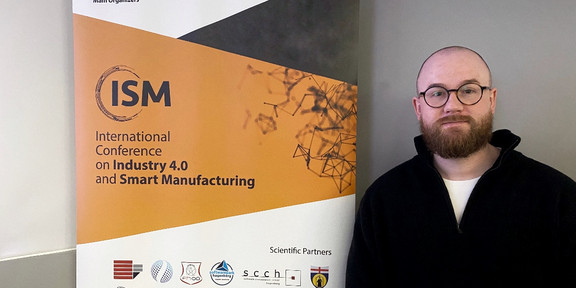2024
SFS presentation on ‘Industry 5.0 in Smart Manufacturing: The Need for Equilibrium in Work Organization’ at the 6th International Conference on Industry 4.0 and Smart Manufacturing (ISM 2024)

Under the title ‘Industry 5.0 in Smart Manufacturing: The Need for Equilibrium in Work Organization’, Thorben Krokowski (Social Research Center, TU Dortmund University), Cornelia Regelmann (Management Accounting and Control, TU Dortmund University) and Daniel Wentzek (Construction and Process Management, TU Dortmund University) presented partial results of their joint research work at this year's ISM in Prague. The three doctoral students of the Research Training Group 2193 ‘Adaption Intelligence of Factories in a Dynamic and Complex Environment’ at TU Dortmund University present a first conceptual-systematic approach that shows how a socio-technical equilibrium can be promoted through targeted work organization measures in the production environment.
The research emphasizes the pivotal role of work organization in the implementation of the Industry 5.0 vision presented by the European Commission in 2021. While Industry 4.0 focuses primarily on technological innovations and smart manufacturing processes, humans are often relegated to the background as a key player. The Industry 5.0 vision attempts to counteract these deficits by focusing more strongly on people. However, the researchers argue that work organization has been insufficiently taken into account in previous approaches. This neglect not only makes practical implementation more difficult, but also prevents the transformative potential of Industry 5.0 from being fully realized. According to the three researchers, a purely technology-centric perspective, in which work organization processes are merely viewed as an extension of production processes, leads to suboptimal implementation. For example, without the targeted integration of employees' needs, the acceptance of new technologies and processes is limited - a factor that can hinder change and reduce the effectiveness of innovative approaches.
In their presentation, the three doctoral students presented an initial, conceptual-systematic approach that shows how a socio-technical balance can be promoted through the targeted and systematic adaptation of work organization. The aim is to harmonize technological advances with the human-centric principles of Industry 5.0, taking into account the potential impact of work organization, and to create the basis for a sustainable, accepted transformation.




![[Translate to English:] [Translate to English:]](/storages/zentraler_bilderpool/_processed_/a/f/csm_Kontakt_b86e8d8ecc.png)
![[Translate to English:] [Translate to English:]](/storages/sfs-sowi/_processed_/7/e/csm_header_collage_sfs_eving_sozialforschungsstelle_dortmund_31bd3c09fb.jpg)